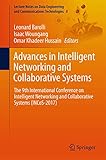Advances in Intelligent Networking and Collaborative Systems [electronic resource] : The 9th International Conference on Intelligent Networking and Collaborative Systems (INCoS-2017) / edited by Leonard Barolli, Isaac Woungang, Omar Khadeer Hussain.
Contributor(s): Barolli, Leonard [editor.] | Woungang, Isaac [editor.]
| Woungang, Isaac [editor.] | Hussain, Omar Khadeer [editor.]
| Hussain, Omar Khadeer [editor.] | SpringerLink (Online service)
| SpringerLink (Online service) .
.
Material type:  BookSeries: Lecture Notes on Data Engineering and Communications Technologies: 8Publisher: Cham : Springer International Publishing : Imprint: Springer, 2018Edition: 1st ed. 2018.Description: XLII, 603 p. 267 illus. online resource.Content type: text Media type: computer Carrier type: online resourceISBN: 9783319656366.Subject(s): Computational intelligence
BookSeries: Lecture Notes on Data Engineering and Communications Technologies: 8Publisher: Cham : Springer International Publishing : Imprint: Springer, 2018Edition: 1st ed. 2018.Description: XLII, 603 p. 267 illus. online resource.Content type: text Media type: computer Carrier type: online resourceISBN: 9783319656366.Subject(s): Computational intelligenceThe aim of this book is to provide the latest research findings, innovative research results, methods and development techniques from both theoretical and practical perspectives related to intelligent social networks and collaborative systems, intelligent networking systems, mobile collaborative systems, secure intelligent cloud systems, etc., and to reveal synergies among various paradigms in the multi-disciplinary field of intelligent collaborative systems. It presents the Proceedings of the 9th International Conference on Intelligent Networking and Collaborative Systems (INCoS-2017), held on August 24–26, 2017 in Toronto, Canada. With the rapid evolution of the Internet, we are currently experiencing a shift from the traditional sharing of information and applications as the main purpose of the Web to an emergent paradigm that puts people at the very centre of networks and exploits the value of people’s connections, relations and collaborations. Social networks are also pla ying a major role in the dynamics and structure of intelligent Web-based networking and collaborative systems. Virtual campuses, virtual communities and organizations effectively leverage intelligent networking and collaborative systems by tapping into a broad range of formal and informal electronic relations, such as business-to-business, peer-to-peer and many types of online collaborative learning interactions, including the emerging e-learning systems. This has resulted in entangled systems that need to be managed efficiently and autonomously. In addition, the latest and powerful technologies based on Grid and wireless infrastructure as well as Cloud computing are now greatly enhancing collaborative and networking applications, but are also facing new issues and challenges. The principal objective of the research and development community is to stimulate research that leads to the creation of responsive environments for networking and, in the longer-term, the developmen t of adaptive, secure, mobile, and intuitive intelligent systems for collaborative work and learning. .


There are no comments for this item.